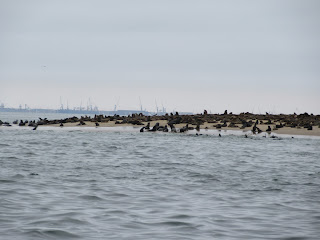Saturday
I went to the third destination: the ocean. For this, I took the ocean tour to
see dolphins and seals in Walvis Bay harbor. First we stopped at a place where
there were a lot of flamingos.
Then we embarked on our catamaran for the
three-hour ocean experience. As we were embarking on the boat, there was a
pelican on the pier.
When we left, a seal followed in the boat’s wake and then
jumped onto the boat. They know that the guides have fish for them.
As the
guide fed it, he pointed out that it has external ears, a distinguishing
feature of the cape fur seals. When the seal returned to the water, the guide threw
fish for it to fetch, which it did and then returned for more.
Next a pelican
joined us on the boat. Pelicans came and went during the trip. Toward the end
of the morning one was near where I was sitting; so I decided to pet it, which
we had been told was OK. It was interesting to feel the different textures on
the neck and body.
We saw
the oyster beds. Namibia produces a lot of oysters because they grow at least
twice as fast as they do elsewhere due to the high level of plankton in the
water and the currents. Some of the oysters are imported from other countries
to be grown here and then exported.
Since the oysters are grown in baskets,
they do not get cleaned by the moving around in the current; so every six weeks
they are pulled up to the oyster cleaning boat and cleaned. Millions of oysters
are exported.
There
are a number of tug boats in the harbor and oil rigs from Angola. They are
brought here for cleaning and repair because of the piracy in Angola.
The
next site was Pelican Point where about 13,000 cape fur seals reside. The area is
literally covered with seals.
The females and babies are on land while the
males are in the ocean.
We could see the small, dark babies, especially with the assistance of telephoto. Even from our
distance offshore we could hear their loud noise.
Then
we stopped for a while waiting for dolphins that did not oblige us with an
appearance. This was my first dolphin tour on which we didn’t see any, but it
was still a nice outing. As we started back to shore, we were served snacks
which included fresh oysters.
On
the way back to Swakopmund, I was fascinated by the water and clouds along the
coast.
Other
than the three outings, Swakopmund was a time for slow, relaxing days, which I
needed. I visited the small museum and aquarium, which has only Namibian fish,
and Kristal Gallerie, which has a collection of crystals found in Namibia. One is the largest quartz crystal cluster on display in the world. It weighs 14,000 kilograms. A
special gem is pietersite, which is unique to Namibia. Being a combination of
tiger’s eye, hawk’s eye and jasper, it is marbleized gold, blue, and brown.
Christmas
decorations are minimal. There is a tree in the center of the town arcade, and
some shops have a few decorations in the windows. At the home where I stayed
there was a tree and there were a few decorations in the living room. The
daughter had made a gingerbread house from scratch, as kits are not available
here. She and her friends baked cookies one afternoon.
I
specialized in eating seafood and relaxing at restaurants with an ocean view.
One day I had kabeljou, the catch of the day which was a new fish for me,
served over vegetables.
Restaurant at the end of the jetty where I ate twice.
Another day I had a grilled seafood skewer served over
a fish fillet.
And another day I had grilled calamari served over grilled
veggies.
I had raw oysters once
and a combo of a tempura oyster, an oyster
baked with cheese, and one cooked with lemon garlic sauce. All were very
delicious.
Since Swakopmund has a large population with German heritage, there
are several bakeries; so I had to try baked goods as well. I ate very well in
Swakopmund and enjoyed every bite. Relaxing and eating in Swakopmund was a
wonderful finish for my southern Namibia holiday.















































